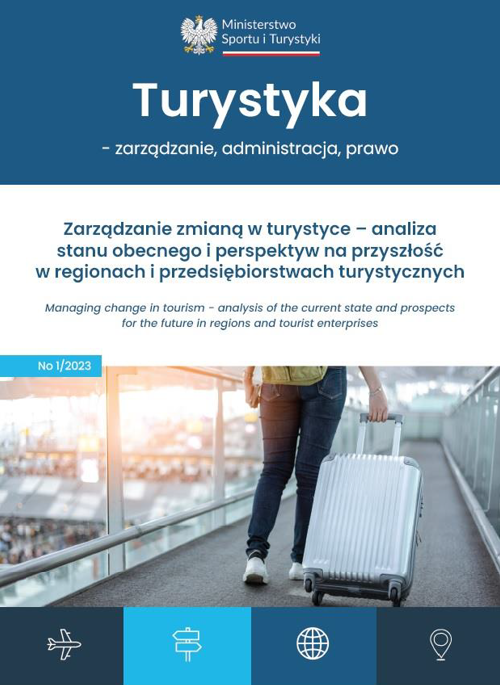Ways to prevent food waste in hotels - Research Paper
Keywords:
food, waste, hotelsAbstract
Food waste is now a global problem and the amount of waste is growing rapidly despite various initiatives aimed at minimizing this problem. This problem particularly affects the hotel industry, and its limitation, due to market and corporate reasons, is not always easy. The aim of the article is to identify methods of reducing food waste in hotels. The main research method was a literature review. The following potential areas for minimizing food waste in hotel gastronomy have been identified: process analysis, measures to reduce purchases and waste use, guest education, system solutions and the use of pro-quality concepts, the use of technical devices, the use of local supplies, cooperation with charity organizations and the production of biogas and compost and animal nutrition. It is also recommended to conduct further empirical research on the identified problem area.
Downloads
References
Antonschmidt, H. & Lund-Durlacher, D. (2021). Stimulating food waste reduction behaviour among hotel guests through context manipulation, Journal of Cleaner Production, 329. doi: 10.1016/j.jclepro.2021.129709.
Baker, M.A., Davis, E.A. & Weaver, P.A. (2014). Eco-friendly attitudes, barriers to participation, and differences in behavior at green hotels, Cornell Hospitality Quarterly, 55(1), pp. 89–99. doi:10.1177/1938965513504483.
Chan, E.S.W., Okumus, F. & Chan, W. (2017). The applications of environmental technologies in hotels, Journal of Hospitality Marketing & Management, 26(1), pp. 23–47. doi:10.1080/19368623.2016.1176975.
Easterby-Smith, M., Thorne, R. & Jackson, P. (2015). Management and business research, Sage, Los Angeles-Singapore.
Frumkin, P. 2001. Hotels rethink dining-concept formats, alliances in face of softening economy, Nation’s Restaurant News, 35(14), p. 51.
Fu-Jin, Wang, Chia-Jen, Hung & Peir-Yuan, Patrick Li (2011). A study on the critical success factors of ISO 22000 implementation in the hotel industry, Pakistan Journal of Statistics, 27(5), pp. 635–643.
Gandhi, P. et al. 2018. Multicriteria decision model and thermal pretreatment of hotel food waste for robust output to biogas: Case study from city of Jaipur, India, BioMed Research International, 2018, pp. 1–13. doi:10.1155/2018/9416249.
Gandhi, P. et al. 2019. Hotel generated food waste and its biogas potential: A case study of Jaipur city, India, Waste and Biomass Valorization, 10(6), pp. 1459–1468). doi:10.1007/s12649-017-0153-1.
Gdzie marnuje się najwięcej żywności? Wcale nie w sklepach. Jest nowe badanie (businessinsider.com.pl, odczyt 29.04.2023).
Giamouri, E. et al. 2021. The food for feed concept. Performance of broilers fed hotel food residues, British Poultry Science, 62(3), pp. 452–458. doi:10.1080/00071668.2021.1877258.
Hotels see return on food waste reduction investment (2018), BioCycle, 59(6), pp. 6–7.
Jabeen, F. et al. 2023). Emotions and food waste behavior: Do habit and facilitating conditions matter?, Journal of Business Research, 155. doi: 10.1016/j.jbusres.2022.113356
Juvan, E., Grün, B. & Dolnicar, S. (2018). Biting off more than they can chew: Food waste at hotel breakfast buffets, Journal of Travel Research, 57(2), pp. 232–242. doi:10.1177/0047287516688321.
Kasavan, S. et al. 2022A. Drivers of food waste generation and best practice towards sustainable food waste management in the hotel sector: a systematic review, Environmental Science and Pollution Research, 29(32), pp. 48152–48167. doi:10.1007/s11356-022-19984-4.
Kasavan, S. et al. 2022B. Challenges for source separation of food waste and turning waste into compost for Island-Based Hotels, Akademika, 92(3), pp. 39–49. doi:10.17576/akad-2022-9203-03.
Lazić, B. et al. 2022. Assessment of restaurants food waste towards circular economy in transition country cities, Environmental Engineering & Management Journal (EEMJ), 21(7), pp. 1147–1156.
Lévesque, J., Perreault, V. & Mikhaylin, S. 2022. Food waste in a hotel foodservice: A case study identifying hot spots and strategies to prioritize towards a reduction, International Journal of Gastronomy and Food Science, 14, 100600. doi: 10.1016/j.ijgfs.2022.100600.
Mak, T.M.W. et al. 2021. A cross-region analysis of commercial food waste recycling behaviour, Chemosphere, 274. doi: 10.1016/j.chemosphere.2021.129750.
Milindi, P.S., De Lieto, F. & Chopra, S.S. 2022. Food Waste-Energy-Water-Emissions (FEWE) nexus in the food service sector: Comparing a restaurant meal from imported ingredients versus an imported ready-to-eat meal, Journal of Cleaner Production, 380. doi: 10.1016/j.jclepro.2022.134871.
Pirani, S.I. & Arafat, H.A. (2014). Solid waste management in the hospitality industry: A review, Journal of Environmental Management, 146, pp. 320–336. doi: 10.1016/j.jenvman.2014.07.038.
Sandaruwani, J.A.R.C. & Gnanapala, W.K.A.C. (2016). Food wastage and its impacts on sustainable business operations: A study on Sri Lankan tourist hotels, Procedia Food Science, 6, pp. 133–135. doi: 10.1016/j.profoo.2016.02.031.
Serving up some food for thought (2009). Hotel & Motel Management, 224(6), p. 46.
Subramanian, K. et al. 2021. Mapping the food waste-energy-water-emissions nexus at commercial kitchens: A systems approach for a more sustainable food service sector, Journal of Cleaner Production, 301. doi: 10.1016/j.jclepro.2021.126856.
Sun, Y., Qian, L. & Liu, Z. 2022. The carbon emissions level of China’s service industry: an analysis of characteristics and influencing factors, Environment, Development & Sustainability, 24(12), pp. 13557–13582. doi:10.1007/s10668-021-02001-y.
The banana index 2023. The Economist z 15.04.2023, s.77.
(Ustawa z 14 grudnia 2012 r. o odpadach (Dz. U. z 2019 r. poz. 701 z późn. zm.).
Wrona, A. 2022. Tona jedzenia miesięcznie ląduje w koszu. Jak nie marnować żywności w hotelach? (horecatrends.pl),odczyt 29.04.2023.



